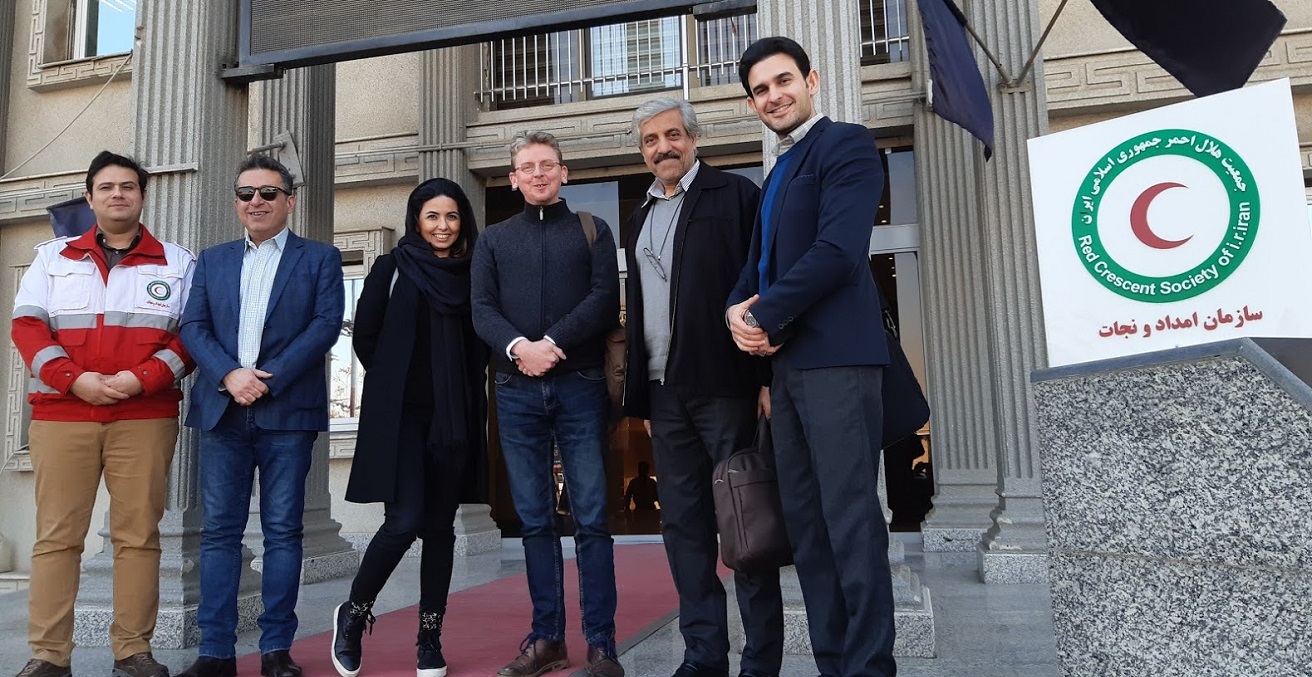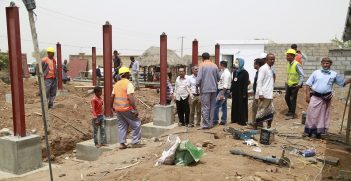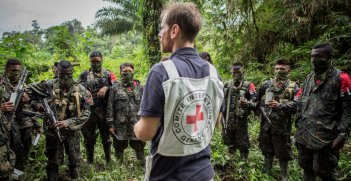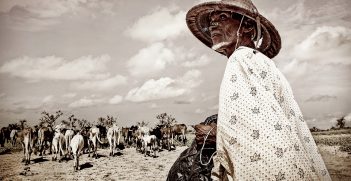Unwelcome Neighbours: COVID-19 and Weapon Contamination

While COVID-19 requires adaptation it hasn’t halted humanitarian work across the Middle East. It might seem strange, but there are parallels between preventing disease and preventing weapon-related deaths.
The Near and Middle East is a place of beauty, kindness, history – and war. Syria, Yemen, and Iraq are among the top five most dangerous places in the world to be a civilian. Lebanon has been gripped by violent protests; conflict in Gaza continues; proxy wars are being fought and regional tensions have increased in recent months. And then, on March 11, the World Health Organization declared a pandemic. There are few countries in the region that have not in some way been affected by these conflicts and there are none that haven’t been touched by COVID-19.
I have the honour of working on projects that decrease threats to civilians from weapons in the region left behind as remnants of war, which is what the ICRC means by “weapons contamination.” I work with a wonderful team of national and international staff in Yemen, Iran, the Occupied Palestinian Territories, Lebanon, Syria and Iraq. We work to reduce threats from unexploded and abandoned weapons, landmines and improvised explosives from battles, artillery, and airstrikes. Our goals are to protect civilians from the explosive remnants of war and enable lifesaving ICRC operations to go ahead more safely in conflict areas. Over the last few months, we had to start becoming “experts” on virus prevention, too.
Since March, we have been asked to work from home, where possible. But this did not mean a suspension of activities for the ICRC. The duty of care continues for those affected by explosive remnants of war, given that the emergence of COVID-19 does not diminish the fallout from conflict. Coronavirus has increased vulnerabilities and exposure to weapons, both through the reduction and cancelation of some services and the increased burden on those remaining. It has weakened already weak public health systems and the economic situation of those most vulnerable to weapon contamination. It has led to the suspension of some weapon clearance operations. It is an extra layer of hurt to the injured, an additional factor to take into consideration in efforts to reduce weapon related risks.
Weapon-related deaths and injuries are a public health issue requiring effective community engagement and messaging. Equally, COVID-19 is a public health issue that requires effective public messaging to help prevent the spread of the disease and care for those affected. The methods, strategies, and expected outcomes for weapon-related injuries are very like those being used for COVID-19, and our target groups can be the same people. We must admit, however, the content of the messages is qualitatively different and mixing them can indeed seem strange.
In recent weeks, we have been working to continue and adapt our weapon risk education and, where possible, combine them with hygiene messages as they relate to COVID-19 prevention. While different from country to country, we work with existing networks of trainers and focal points, usually the wonderful Red Cross and Red Crescent volunteers. We aim to capitalise on those networks, even in a small way, and to make contributions to the global effort to control COVID-19. We have seen fun and informative video spots being produced for distribution by messaging apps, community consultations over the web, and through our networks, have had the opportunity to distribute basic hygiene items and messages.
Many face-to-face meetings, training seminars, and assessments have had to be suspended, requiring us to change our approach and expectations. We needed to shift our direct communication and training to social media and messaging applications. This is an imperfect solution, and such communication methods need to be accompanied by direct training and situational analysis. Nonetheless, continuity of support for those affected by weapons will prove crucial as the region begins to emerge from lockdown measures.
We also provide advice on the use of personal protective equipment (PPE). While our equipment is more suited to bomb disposal or chemical and biological hazards than virus transmission, there is nonetheless some crossover in our expertise in this area. In this way, the experience of our advisors has played an important role for Red Cross and Red Crescent national societies and ICRC delegations in understanding what PPE measures may be appropriate in different circumstances. This has proved challenging as there has been a great deal of uncertainty about the role and effectiveness of PPE, but it remains an area we have been able to contribute to.
On a more personal note, the last couple of months have proved challenging, requiring an enormous adaption of professional and personal expectations for me and all the staff. We have all gone through pretty much every emotion in recent weeks and, in many cases, have been separated from our homes and families. The lockdown in our region has often taken a very serious character. Armed men and women in full PPE have been mobilized in some settings, and lockdowns are often enforced by the military. Land border and airport closures, curfews, and limitations on movement remain in many countries. This seems to have led to a decrease in battles and major weapon-related events in the region. But this is a highly variable situation, having no bearing on people’s vulnerability to explosive remnants of war, and is doing nothing to mitigate economic and social hardship.
What is heartwarming is that while many of my colleagues had the opportunity to leave, they chose not to. In the beginning, we were all disappointed about plans that had to be cancelled, but COVID-19 also seems to have led to a creative surge. I have been surprised by how well we have managed using video conferencing, phones, and local networks to keep things running. It is a lesson for us that there are different ways of working, some of which should stay, especially those that help protect the natural environment.
For now, our infrastructure and networks remain in place and we have the resources to sustain them for a while. The Red Cross and Crescent Movement will always be needed at the front line of the fight against pandemic and weapon contamination. I worry that states will become inward looking at a time when we need to look outward, caring for our neighbours just as we care for our families. States do not exist in a vacuum, as any country bordering a conflict knows. Those with resources need to continue supporting states and people that are less well-off. It is in their interests to do so, and it is simply an ethically good thing to do.
My hat goes off to the government of Jordan. As of 17 May, there are 613 COVID-19 cases among ten million people. The government has kept us informed with daily briefings and clear messages, and the people of Jordan have remained patient, kind, and considerate. The lockdown is being relaxed a little now. We can expect a fuller return to office-life in June and regional travel in the months following – all things being equal. I do not know when I might get to Australia again. I miss the quiet and cleaner air. But Jordan and the region’s economic and social heart needs to beat again if it is to thrive. I hope some of the lessons of the lockdown will help governments see that this progress can take place with the possibility of clean air and peace, if that is also a priority.
Reuben McCarthy is a regional weapons contamination manager in Amman, Jordan for the International Committee of the Red Cross.
This article is part of the “Conflict and COVID-19″ series highlighting the overlapping humanitarian fallout of war and pandemic by the International Committee of the Red Cross, in partnership with AIIA.
The views expressed above are those of the author, and do not necessarily represent those of the ICRC.





